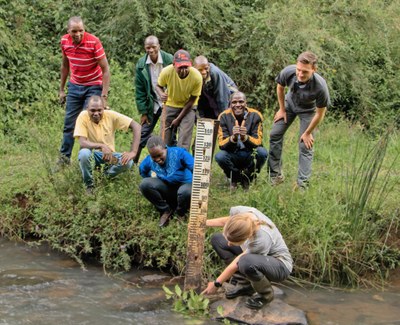17.08.2022 - Community-based water research
Kurt-Eberhard-Bode Fondation funds Junior Research Group HydroCrowd at the Justus Liebig University Giessen - Innovative Water Resource Monitoring Project in Tanzania, Ecuador, and Honduras.
Great success for Dr. Suzanne Jacobs and Dr. Björn Weeser from the Justus Liebig University (JLU) Giessen. The Kurt-Eberhard-Bode Foundation awarded the research team with funding of 479,900 Euro in order to establish the junior research group “HydroCrowd - Citizen Science in Hydrology”. The funds will be used to develop innovative strategies for the monitoring of water resources in Tanzania, Ecuador, and Honduras over the next three years.
The team from the Center for International Development and Environmental Research (ZEU) at JLU Giessen was able to convince the foundation with their project proposal in the framework of the "Water - Sustainable Resource Usage" program. The aim of the project is to gather data on water quantity and quality in the East African and Latin American countries. The novelty: citizens will be involved in the research, as the name of the project already suggests. Why is this necessary when numerous methods for automatic water monitoring already exist? "Such automatic systems are expensive, and many countries do not have the infrastructure to support them", says Dr. Suzanne Jacobs. "We therefore aim to identify and develop methods which are inexpensive and can easily be used by the citizens without requiring specialized training."
During the project, measuring stations will be installed close to rivers. A sign next to the station will explain how it works, allowing people of all ages to participate. Measured parameters include rainfall as well as the air temperature and relative humidity. These data can later be used to calculate evaporation, which is a key component of the water balance. In the river, citizens will be able to measure the water level and turbidity. While the water level will be used to determine the discharge, turbidity serves as an indicator of water quality, since water from the river is directly used for consumption in many countries. The citizen scientists, both members of the local community and tourists, will submit their measurements using smartphones.
The research team also aims to examine the motivation of the citizen scientists to better understand why people participate in such projects. These findings can be used to develop more effective citizen science projects in the future. The data collected by the citizens will be used to set up hydrological models that can support sustainable water resource management. In order to gain a broader perspective, the team will combine the measurements with satellite data and apply artificial intelligence methods. The models will also consider water usage conflicts, since water is not just used for drinking, but also for irrigation, industry, and power generation.
"Access to water has been recognized as a human right and is one of the Sustainable Development Goals in the Agenda 2030 of the United Nations”, explains Dr. Björn Weeser as he emphasizes the relevance of the research project. "Meanwhile, we observe a decrease in the number of hydroclimatic monitoring stations around the world. By involving the general public in data collection, the number of measurements can be increased; and this is what we aim at."

Citizens inspect a water level gauge in Kenya together with the research team Dr. Jacobs and Dr. Weeser to determine the water level
Foto: Fabia Codalli
About the Kurt-Eberhard-Bode Fundation im Stifterverband
Founded in 1987 by Hamburger entrepreneur Eberhard Bode, the Foundation funds interdisciplinary research in the life sciences, natural sciences, as well as bioinformatics and informatics. The "Water - Sustainable Resource Usage" program was first announced in 2012. Calls are published every three years. Through its program, the Kurt-Eberhard-Bode-Stiftung aims to foster interdisciplinary, applied research concepts among young scientists, resulting in innovative strategies and concepts at the intersection of science and society.
Contact
Dr. Suzanne Jacobs
Dr. Björn Weeser
Zentrum für internationale Entwicklungs- und Umweltforschung (ZEU) der JLU Gießen
Senckenbergstraße 3
35390 Gießen
